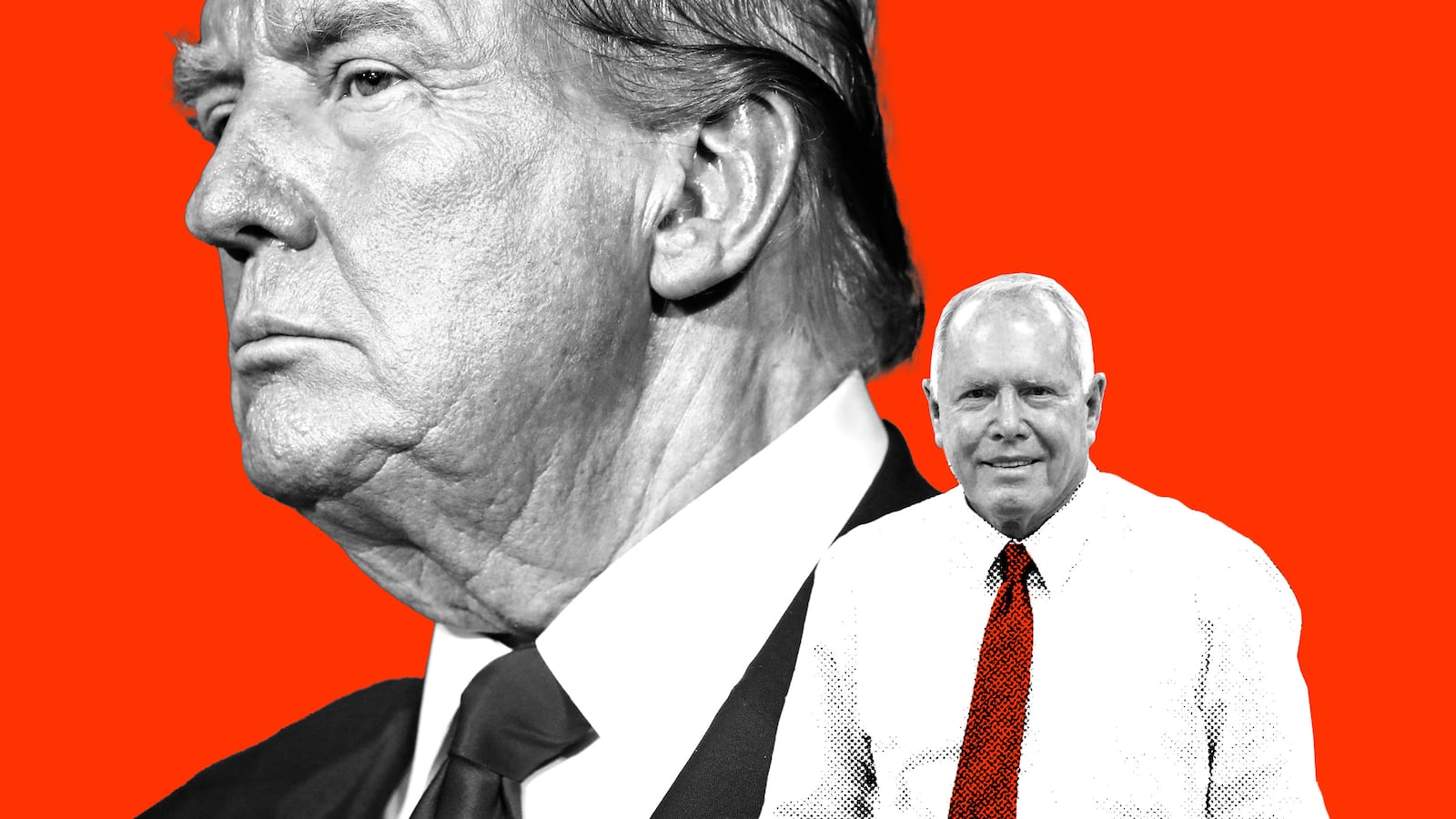When billionaire financier Don Hankey underwrote Donald Trump’s $175 million bond this week, it wasn’t the first time that Trump had taken money out of his pocket—nine months into Trump’s first term in office, his Justice Department sued Hankey’s financial company for unlawful lending practices.
The subject of that suit, however, also revealed a historical commonality with Trump: disrespecting members of the U.S. military.
According to the settlement agreement in the case, Hankey’s company—Westlake Services—had systematically violated the rights of military employees over a period of several years, illegally repossessing dozens of cars in violation of the Servicemembers Civil Relief Act. Westlake immediately settled, agreeing to pay $700,000 in damages to the affected servicemembers, along with a roughly $61,000 fine to the federal government.
Then, while the government was monitoring Westlake’s compliance, the DOJ discovered new SCRA violations, forcing the firm to pay another $225,000 to settle those allegations in 2022. Combined, the full payout came to just under $1 million. Hankey—Westlake’s founder, chair, and largest stakeholder—was not personally named in the complaint, and the settlement was signed by company president Ian Anderson.
Hankey’s past is important context for his loan to Trump, and his company’s choppy history with federal law enforcement—as well as the fact that his firm would be regulated under a potential second Trump administration—may cast the loan in a new light.
At the time of the repercussions, federal violations weren’t new to Westlake. Hankey, whose estimated $7.4 billion net worth outstrips Trump’s, made his fortune in the repo world, targeting low-income customers with high-interest auto loans.
In fact, two years before the DOJ sued Westlake and its wholly-owned subsidiary Wilshire under the SCRA, those same two entities were nailed by the Consumer Financial Protection Bureau for “illegal debt collection tactics,” resulting in more than $44 million in restitution payouts and a civil fine of $4.25 million.
In the initial DOJ complaint, filed on Sept. 17, 2017, the Trump administration alleged that Westlake had unlawfully seized at least 70 cars from servicemembers, in violation of protections under the SCRA. (While the complaint itself bears the imprimatur of Trump’s first attorney general, Jeff Sessions, the investigation was launched under President Barack Obama, whose DOJ first notified Westlake of the probe in October 2016.)
According to prosecutors, over a period of five years, Hankey’s firms had repossessed dozens of vehicles belonging to military employees without obtaining the necessary court orders required under the law. Four of the seizures took place while members were either on active duty or within one year of their departure.
“Westlake and Wilshire specifically target servicemembers, including junior enlisted servicemembers, as customers for their subprime and near-subprime loan products,” prosecutors said. The complaint noted that the unlawful repossessions were “intentional, willful, and taken in disregard” for the members’ rights, citing the fact that Hankey’s firms had followed the proper procedures when it was in their interest—like when it came to approving servicemember requests for interest rate reductions.
Hankey’s firms settled the case in 10 days, agreeing to compensate the affected servicemembers at the rate of $10,000 per unlawful seizure—a total of $700,000—and to pay a $60,788 financial penalty to the DOJ.
Then, almost five years to the day after the first complaint, the DOJ announced they had reached a second, amended settlement agreement with the same entities, regarding additional violations uncovered while the feds were monitoring the firms’ compliance with the SCRA. Those infractions involved failing to properly provide interest rate benefits to qualified servicemembers and unlawfully delaying the approval of benefit requests. The additional damages and fines brought the total financial penalties to about $1 million.
Those fines, however, pale in comparison to Hankey’s recent backing for Trump. That support actually started in 2022, when online lender Axos Bank—where Hankey is the top institutional shareholder—floated $225 million to buoy the Trump Organization’s finances after customers and other banks cut ties in the wake of the Jan. 6 assault on the U.S. Capitol.
On Tuesday, Hankey told The Washington Post that he didn’t have advanced knowledge about those earlier Trump Org loans. The bank’s top executive previously said that Axos had approved those loans because they were financially profitable, not for political interests.
The Daily Beast reached out to Hankey, Westlake, and a Trump spokesperson, but did not immediately receive a reply.
This week, however, Hankey underwrote the $175 million bond that Trump needed to post in order to pursue an appeal of a $450 million civil judgment against him, which a New York judge imposed last month after finding Trump guilty of fraudulently misrepresenting his wealth for years to secure favorable terms on loans.
For a while, it didn’t look like Hankey’s money would be needed. An appeals court had previously granted Trump’s request to reduce the bond from the full $450 million, an amount that none of the 30 lenders Trump approached was willing to extend to the cash-strapped candidate, citing a lack of acceptable collateral.
Trump, who hadn’t approached Hankey when making those first rounds, said he had enough cash on hand to front the $175 million, but then, The Washington Post reported, Trump changed his mind. Hankey, who reportedly first reached out to Trump at his wife’s suggestion, got a call—“to his surprise,” according to the Post—and accepted Trump’s request.
Hankey—a conservative California billionaire who recently purchased a Palm Beach mansion not far from Trump’s Mar-a-Lago resort compound—appears to cut the profile of a typical Trump megadonor, but he hasn’t personally given to Trump. In fact, Federal Election Commission records show that Hankey isn’t an active donor generally, with his only major donations going to Trump opponents—maximum contributions to two of Trump’s primary rivals in 2016, Sen. Marco Rubio (R-FL) and former Florida Gov. Jeb Bush, along with a total $5,300 in 2014 and 2015 to Democratic Rep. Ted Lieu, in Hankey’s California district.
However, Hankey’s wife and his son—Nowcom president Don Rufus Hankey—are both Trump donors. Debbi Hankey contributed a few hundred dollars to Trump’s failed 2020 re-election bid, and in 2016 Don Rufus Hankey gave $40,400 to a joint fundraising effort supporting Trump and the Republican Party, FEC records show.
Trump faces a tough case on the fraud appeal, which he is pursuing while simultaneously fighting on a number of other legal fronts. Those cases include, but are not limited to, his appeal of an $83 million judgment for sexually assaulting and then defaming writer E. Jean Carroll (which also required a third-party bond).
Also this month, Trump will go on trial again in New York for allegedly falsifying business records to cover up hush money payments to an adult film star weeks before the 2016 election. He also faces 10 felony state charges in Georgia related to his efforts to overturn the 2020 election results, along with dozens of additional counts stemming from federal criminal indictments in both Florida and Washington, D.C.—where he is charged with unlawfully retaining national defense information and obstruction of justice, and illegally attempting to retain power after losing to President Joe Biden, respectively.
Trump is also running for president again, with his his donors paying his tens of millions of dollars in legal fees.









